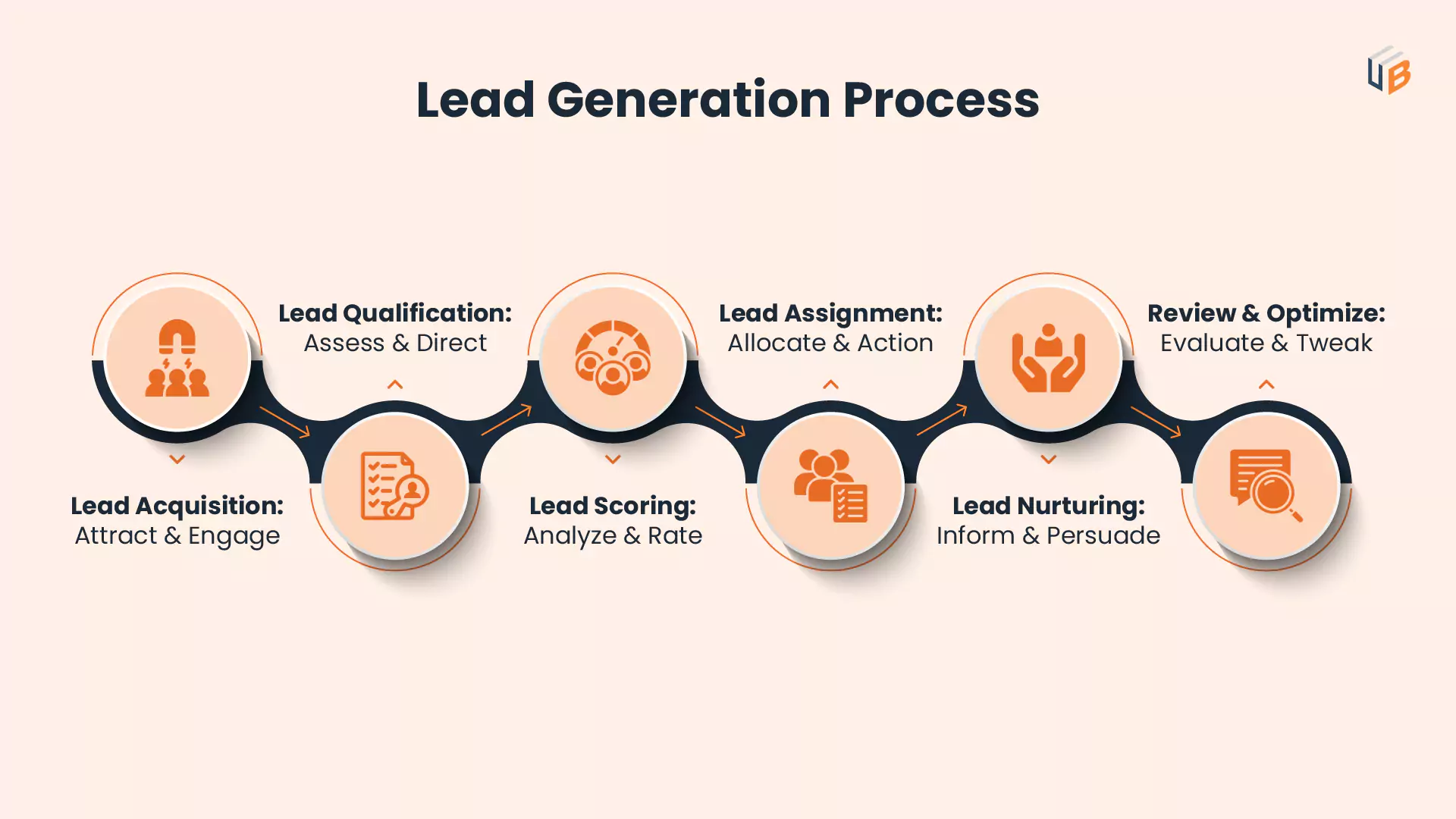
Buyers go through a series of stages before they’re ready to make a purchase. Unlike decades ago, buyers can find the information they need to make buying decisions without talking to a sales representative. With this shift, companies cannot just send sales messages and expect to sell. They must find the right prospects and demonstrate to them that their solutions are the best in solving their problem. That’s where lead generation vs lead nurturing comes in handy.
From the buyer’s journey perspective, lead generation precedes lead nurturing. However, both play a critical role in fueling your B2B sales process. In this article, we explore the differences between generating and nurturing B2B leads and show you strategies that work for each.
What is Lead Generation?
Simply put, B2B lead generation is any action or process your business takes to identify and capture the details of potential buyers. Often, these are consumers who are interested in the services or products your company offers. In the B2B industry, lead generation involves creating a database with lead contact details. These details are obtained from your company’s interaction with potential buyers.

Why Generate Leads?
The goal of lead generation is to produce high-quantity marketing-qualified leads (MQLs). Marketing efforts focus on the awareness stage of the customer journey. The idea is to add new buyers to your company’s customer base. To achieve this, you must focus on B2B lead quality and quantity.
How Lead Generation Benefits Your Company
Your company must generate quality leads to meet its sales objectives. The more B2B leads you generate the higher your chances of selling. Lead generation offers the following benefits to your company:
- Increased Brand Awareness : Lead generation strategies like content marketing allows you to place your brand in front of new lead segments.
- Improving Lead Conversion : Generating high-quality MQLs increases the likelihood of converting them into paying customers.
- Expanded Revenue Potential : Quality leads increase your company’s chances of reaching its revenue goals.
Improve Lead Generation with Intent Data
B2B intent data gives businesses valuable insights into what prospects search online, the keywords they use, the website pages they view, and the content they download. These insights can improve lead generation by:
-
- Focusing on High-Intent Prospects: B2B marketers can leverage intent data to compile prospect lists that match their ideal customer profiles. This enables them to focus on high-intent prospects or accounts.
- Retargeting Ads: With intent data, you can monitor online engagements, including viewing prospects that engage with your website and retargeting them with relevant programmatic ads. This ensures your brand remains top of mind for your visitors.
- Personalize ABM Campaigns: Intent data provides signals on when your target ABM accounts are actively searching for solutions. This way, you can maximize lead generation efforts by personalizing ABM campaigns across multiple channels.
- Content Syndication: Use intent data to determine the content needs of your target audience. Once you know the issues your target audience cares about, develop high-value content and syndicate it.
What is Lead Nurturing?
B2B lead nurturing involves building meaningful relationships with prospects to earn their trust, guide them down the sales funnel, and get them closer to making a buying decision. To succeed in this, your team should anticipate the needs of your MQLs based on where they are on their purchase journey, their title, industry, and their role in the business. Lead nurturing efforts should commence at the consideration stage of the buyer’s journey.
Why Nurture Leads?
96% of potential buyers in your lead generation system are not ready to make a purchase. To convert MQLs into SQLs, and ultimately paying customers, you need to interact with them in a personalized way to build trust.
How Lead Nurturing Benefits Your Business
B2B buyers do business with companies they know and trust. Nurturing leads allows you to connect with your prospects and start building a relationship with them. This connection offers your company a range of benefits including:
- Causing your Company to Stand Out: With the majority of B2B buyers conducting online research before making a purchase, lead nurturing ensures your brand remains visible to prospects throughout the consideration and decision-making stages.
- Educating Prospects: Enables leads to understand your solutions better and understand how you solve their challenges.
- Customizing Experiences for Prospects: Customers respond to personalized experiences better. Lead nurturing helps your company to understand leads and engage them with relevant and highly personalized content that resonates with them.
- Boosting Lead Conversion: Helps you find prospects whom you can easily convert because they’re interested or actively searching for your products or services.
Convert More Leads with Lead Nurturing Strategies
There are numerous lead nurturing strategies. However, the following 6 work best for all businesses, irrespective of size:
- Customize Marketing Content: This lead nurturing strategy requires a good understanding of buyer personas. Segment your leads accordingly then customize your content to the needs, interests, goals, and preferences of your leads.
- Provide Multiple Touchpoints: Lead nurturing involves providing prospects with content that helps them progress through the buyer’s journey. Leverage different content types to address the concerns and questions your leads might have. Some of the content types to consider are case studies, blog posts, videos, social media posts, and direct mail. Distribute this content across multiple communication channels like emails, paid ads, websites, and social media pages.
- Score your Leads: Use marketing automation tools to score your leads based on their browsing history and social media interactions. Through lead scoring, identify which leads your sales reps should follow immediately and which ones need more nurturing.
- Follow-up on Qualified Leads: Conduct timely follow-up of leads via email or phone calls to convert them into sales opportunities or customers.
- Align Sales and Marketing Functions: Use tools such as workflows, lead scoring, and service level agreements to align your sales and marketing teams. Both teams contribute to the lead nurturing process. They should know at what point in the buyer’s journey leads should be handed over to the sales team for conversion.
Lead Generation vs Lead Nurturing: Mistake to Avoid
Lead generation and nurturing go hand-in-hand. However, some businesses make the mistake of focusing more on lead generation and less on lead nurturing. Placing more emphasis on lead generation rather than lead nurturing will jeopardize all your marketing efforts and cause your sales teams to target leads that can’t pay for your services or products.
Lead nurturing helps you find prospects who are interested and actively searching for your offerings. Without it, you’ll have many leads that don’t need your products. As a result, your sales team will struggle to convert leads and frequently miss targets.
UnboundB2B’s Full Spectrum Lead Generation Methodology
When it comes to growing a business, lead generation and lead nurturing should not be viewed as separate processes, but as one. Both play a critical role in generating sales revenue for the business. Lead generation helps you find buyers who are interested in your products, while lead nurturing allows you to engage, build trust, and increase their chances of buying from you.
UnboundB2B’s marketing services span through the entire lead generation and lead nurturing process. We can help your company find quality leads, show you how close those leads are to making a buying decision. Working with our team of experts, we will help you nurture your leads down the sales funnel with our unique content syndication services, Webinar Leads, and sales calls to convert them faster.
FAQs
1. How does lead generation differ from lead nurturing?
Lead generation focuses on finding prospects that are interested in your products whereas lead nurturing focuses on building relationships with those prospects to increase their chances of making a purchase.
2. What is lead conversion?
Lead conversion involves turning prospects into paying customers by guiding them towards making a buying decision.
3. What is lead scoring?
Lead scoring is the objective ranking of leads using a scale that represents the value each lead offers to the company to determine where leads are actually in the purchase stage and align engagement priorities accordingly.
Our blog
Latest blog posts
Tool and strategies modern teams need to help their companies grow.

Running a business comes with its own set of challenges, especially when it comes to ...

AI is surely a futuristic concept but it evolves today, particularly in sales and mar...

A successful webinar requires more than just a great speaker and a compelling topic. ...






